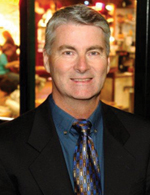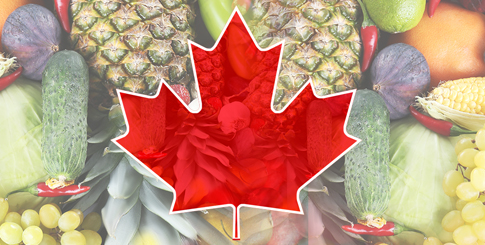As Canada commemorates its sesquicentennial this year, there is much to celebrate. Of course, there are also areas of ongoing concern—and this is true for the fresh produce industry as well. For this year’s True North supplement, we departed from our usual coverage to talk with 14 business leaders who have had a sustained impact on the Canadian fresh fruit and vegetable supply chain.
Among the common characteristics of these influential leaders are their acute vision and ability to juggle personal and professional lives. All are supreme multi-taskers. For most, it’s not enough to lead large companies and develop innovative programs and practices; they are also heavily involved in industry organizations as founders, board members, educators, and advocates.
As you will read, a background in produce is not a prerequisite for a successful career in buying or selling fruits and vegetables. But all of these individuals share a curiosity, enthusiasm, and passion for the produce industry, imbuing their respective companies with fresh insights and, perhaps most importantly, a positive outlook to inspire those around them.


Name: Larry Davidson
Title: President
Company: North American Produce Buyers Ltd.
Location: Toronto, Ontario
Larry Davidson never intended to take over the family business. His father and grandfather, who founded the company, were at the helm and he just helped out in the summer. But when Davidson was in college, his grandfather suffered a stroke and was no longer able to run things. This left his father in charge.
At the same time, major chain stores across Canada were moving to a direct procurement model, which took a huge bite out of the company’s coffers—losing a heart-rending 75 percent of its business practically overnight. As Davidson recalls, the company struggled to maintain its footing for several years. After he graduated and was headed to law school, he offered to help his father close down the company. He’s been there ever since.
“It was a business that was quite small and sold only vegetables, and we turned it around with help from staff and suppliers,” Davidson remembers. He and his brother, Steven, who run the company together now, decided to shift gears and handle only fruit with a primary emphasis on stone fruit and grapes, with a complementary focus on citrus, apples, and pears. By drilling down on two or three major products, the company is in a better position to offer steady supply of these items all year. And so it does—North American Produce Buyers is known as a go-to supplier of stone fruit and grapes, 52 weeks a year.
“There’s an advantage to focusing because I don’t think you can be great at everything,” comments Davidson, who as president oversees the company’s two main programs and major customers. “It’s not realistic to expect every customer’s full support on all items, but we felt there was a niche as a year-round supplier in stone fruit.”
Working with growers in South America and California, Davidson gets a firsthand look at the challenges wrought by weather, labor shortages, and regulatory issues. But one of his biggest concerns these days is the greying of the industry.
He fears the lack of talented younger people embracing the produce business as a vocation could have a lasting impact. While some younger workers are attracted to organic and “boutique” farming, neither is the primary or current force behind the consumption of produce—but Davidson thinks both have the potential to change the industry.
“My experience says if you bring a really fancy box of produce to a friend or colleague, the reaction is always to say, ‘Wow, where can I get this?’ The bar is set so low with produce we need to take advantage of [such trends], to get out in front and be proud of [selling fruits and vegetables]. By supporting growers and speaking to rising consumer awareness of health benefits, we could just blow the doors open with produce.”


Name: John DiMenna
Title: President & CEO
Company: Red Sun Farms
Location: Leamington, Ontario
Jim DiMenna’s journey to becoming the chief executive officer of Kingsville, Ontario’s Red Sun Farms is so perfect it might have come out of a children’s storybook: at the tender age of ten, he started out with a little red wagon, selling onions door to door.
After paying his dues as a manual laborer and gaining experience in the Canadian produce industry, which included purchasing, shipping, and sales, DiMenna built relationships with key partners in every aspect of the business. In 1990 he founded a company that would become one of Canada’s foremost greenhouse growers.
Surprisingly, his primary inspiration was never farther away than his own home: “My passion for the produce industry was inspired by my dad, who immigrated to Canada with my family and never stopped trying to succeed,” he says.
A beneficiary of the Canadian Produce Marketing Association (CPMA) prestigious “Person of the Year” award in 2011, DiMenna has been a tireless worker for expanding the purview of that organization, for which he previously served as chairman. Under his direction, he became an exemplar of the industry, leading its role in the Produce Traceability Initiative and other programs. “The CPMA and Red Sun Farms were both proud to partner with events and organizations such as Southern Exposure, Viva Fresh, and United Fresh, which help shape the industry and provide a voice for retailer needs by addressing issues, showcasing products, and facilitating meetings between current and potential retailers.”
DiMenna’s frequent off-hours work with these and other committees are part of his dedication to making the produce industry stronger. His time at the helm of CPMA is his fondest memory of life in the industry, particularly when he worked with the Canadian Horticultural Council to institute a PACA-like trust for his country.
After 50 years in the produce trade, working with private as well as public sector stakeholders, DiMenna has seen just about everything there is to see, and, at a time of great upheaval, has found plenty of reasons to be hopeful. “There are many challenges we face for our industry—government regulation, worker programs, taxes, and energy costs—all continue to be issues,” he admits. But DiMenna sees his silver lining in the ongoing march of technology. “The need and desire of everyone to have a healthier diet will be the biggest advantage for the industry in the near future,” he explains.
“With the continual advancement of science, we understand more about what constitutes a healthy diet and lifestyle,” DiMenna continues. “Because of this, we are optimistic that we will definitely see increased consumption of fresh fruits and vegetables.”


Name: Mike Furi
Title: Quality Assurance Manager
Company: Federated Co-operatives Limited
Location: Saskatoon, Saskatchewan
The road from the warehouse to chairman of the Canadian Produce Marketing Association (CPMA), is one that Mike Furi of Federated Co-operatives, Limited has travelled successfully over the last 40 years. A natural leader, Furi has served as a member of his town council for 17 years, as a fundraiser to build a local arena, and as a board member of the summer “Shakespeare on the Saskatchewan” festival.
“At 18, my dream was to become a pilot,” Furi reflects, “but instead, I took a well-paying job at Western Grocers.” Surprisingly, he notes, “I found I really loved the grocery business. By the time an opportunity in produce presented itself, I’d been brought along by strong mentors like the late Gerry Bonin. As I progressed into procurement, I got to work with great people like Wayne McKnight, one of the first directors at Walmart Fresh.”
Furi joined The Produce People, a division of Federated Co-op in 1993, working his way up in procurement. He built solid relationships with vendors and developed standards for the company and its distribution centers. “We didn’t approve vendors just on price,” Furi explains. “We were always more interested in quality and consistency. Our approach was to be loyal to our vendors and we expected them to be loyal to us.”
He is justifiably proud of building the procurement and pricing department into a nimble and proactive organization. “We did whatever was necessary to keep the market competitive. We looked at average costing to identify profitability—that made us able to demonstrate why we priced things as we did.” In late 2016 Mike took his depth of experience to a more focused role as quality assurance manager for produce at the Federated Co-op corporate office.
In addition to his day-to-day work, Furi is involved with a number of boards, including CPMA. He has served on the board since 2002 and was chairman of the board for the 2015-16 year. “This was one of the most rewarding experiences of my career,” he shares.
“At the start of my term, I traveled all over Canada and the United States meeting producers, growers, and retailers. I used the opportunity to explain what the CPMA can do for them. It was an intense two weeks,” he admits, “but I had amazing support from my team that made everything go smoothly.”
He has also worked closely with the Fruit and Vegetable Dispute Resolution Corporation (more commonly referred to as simply ‘the DRC’) to create a level playing field for everyone along the food supply chain and to promote honest business practices. Furi firmly believes it is “vital to ensure that everyone can make a decent living. We must work together as an industry to provide good quality products at pricing and volume commitments we honor—a lot rides on a handshake.”
The CPMA, Furi notes, would like to see a government policy that encourages a yearly increase of 20 percent more produce consumption. “That’s just an additional piece of fruit or a half cup of vegetables daily. Studies suggest that consuming more produce would bring down annual Canadian healthcare costs by $4 billion.”


Name: Doug Grant
Title: Executive VP & Chief Operations Officer
Company: David Oppenheimer & Associates General Partnership
Location: Vancouver, BC
Doug Grant spent 12 years in information technology (IT) at the British Columbia Automobile Association, never expecting to wind up in the produce industry. “When I joined the Oppenheimer Group in Vancouver in 1995 as IT manager, I figured I would work there for a couple of years, and then move on. Instead, I fell in love with this dynamic industry.
“I realized early on that Oppenheimer had a very unique business. Rather than purchasing a ‘packaged’ ERP system, we decided to hire software developers to build our own. This continues to be a key competitive advantage for our company. Meanwhile, I was learning other aspects of the business so that when opportunities in new areas presented themselves, I was ready.”
The Oppenheimer Group, more commonly known as “Oppy,” partners with growers around the world and provides a wide range of services. Grant wears many hats in addition to his IT responsibilities, from quality control and transportation to grower relations and contracts. He also has executive oversight for North American exports and Oppy’s offices in Chile, Argentina, and Peru.
Grant’s expertise led to other positions outside the company, including co-chair of the Produce Traceability Initiative leadership and executive council, and as a board member of the Center for Produce Safety, which shares science-based solutions to prevent or minimize produce safety vulnerabilities.
To Grant, the produce industry’s biggest challenge is food safety. Citing major outbreaks over the years, he says there are still many ‘unknowns’ as to how pathogens are spread. “Through the Center for Produce Safety, we raise money to support research efforts. Everyone in the industry must have a culture of food safety; I see it as vital to preventing outbreaks and providing healthy, wholesome food.”
He also believes industry opportunities lie in sustainability. “There are three parts to the sustainability equation: first, social responsibility by benefitting the standard of living for farm workers around the world. Fair trade certification is a good example, where a portion of the profits goes directly to the workers to fund schools, etc. The second element is improving the environment—promoting best practices for managing resources for the most optimal stewardship of the land and water. And third, achieving a sustainable profit for all stakeholders in the supply chain.”
Grant’s efforts on behalf of the industry have not gone unnoticed. He was CPMA’s “Produce Person of the Year” in 2003 and a Packer “Top 25” industry selection in 2012. As for mentors and colleagues, there are several individuals he particularly admires.
“First, my boss, John Anderson, who’s an innovative entrepreneur and a great influence in our industry. He has always been supportive of me personally and my initiatives. Also, Tim York from Markon Cooperative, Inc.—he’s spent a huge amount of volunteer time on committees and has made a big impact on the industry.”
Outside the produce industry, Doug serves on the organizing committee and participates in an annual 132-kilometer road bike event, which raised $150,000 last year for the Foundation for Fighting Blindness.


Name: David Karwacki
Title: Chief Executive Officer
Company: Star Produce
Location: Saskatoon, Saskatchewan
Saskatchewan isn’t the first place that comes to mind when people think of ripe melons, sweet strawberries, or crunchy cucumbers. But that’s where David Karwacki co-founded Star Produce Ltd., 27 years ago, in a little room in Saskatoon. “It was a lot easier then,” he recalls, “we just needed some friends and a phone.”
A few years earlier, Karwacki had been a basketball-playing college student whose dream was to trade commodities at the Chicago Mercantile Exchange. But it turned out that he liked a girl in Saskatoon more than he liked pork bellies. So he wound up staying in Saskatchewan, getting married, and working at a produce company for eight months before joining forces with a friend to launch an independent tomato repacking business.
The original company is now a global organization comprised of six companies that grow, supply, process, and pack fresh produce. Growth has been organic, according to Karwacki, thanks to customers and partners who have made suggestions over the years on how to add value and innovate.
As CEO of the parent company, Karwacki spends most of his time focused on the latest industry developments around the world and how to move the company forward as demand for fresh fruit and vegetables continues to boom. “I look at what the future of the produce industry is going to be, and what kinds of items or commodities we think will capture the imagination of the consumer,” he explains. “I always tell my team that we search the world for big taste, so we want to be the most innovative team in produce.”
Karwacki embraces innovation with gusto, looking forward to the next project or discovering the next big product. Recently, he has been working on ‘Whole Leaf’—a new Star Produce company that’s building a high-tech greenhouse in Alberta to grow lettuce, beginning this summer. As Karwacki puts it, “We’ll be producing living lettuce that’s like nothing anybody in North America has seen before. It’s really cutting edge.”
Among the ongoing challenges is food safety for every step along the supply chain. As more retailers and suppliers across the industry lead the charge on this issue, Karwacki predicts increased collaboration to make the industry— and its products—safer for consumers. “Food provenance is becoming increasingly important to consumers,” he says. “So we’re committed to having state-of-the-art facilities in everything we do, from seed all the way through.”
As for opportunities, he points to a growing middle class around the globe that wants more and better fresh fruits and vegetables. “We’re not selling cigarettes; retailers want to promote what we’re selling,” he contends. “It’s such an opportunity for our industry to produce food that tastes great: a melon that’s sweet like candy, a tomato that tastes like your backyard. The world is looking for them.”
Image: Ilya Bolotov/5 second Studio/Shuterstock.com



